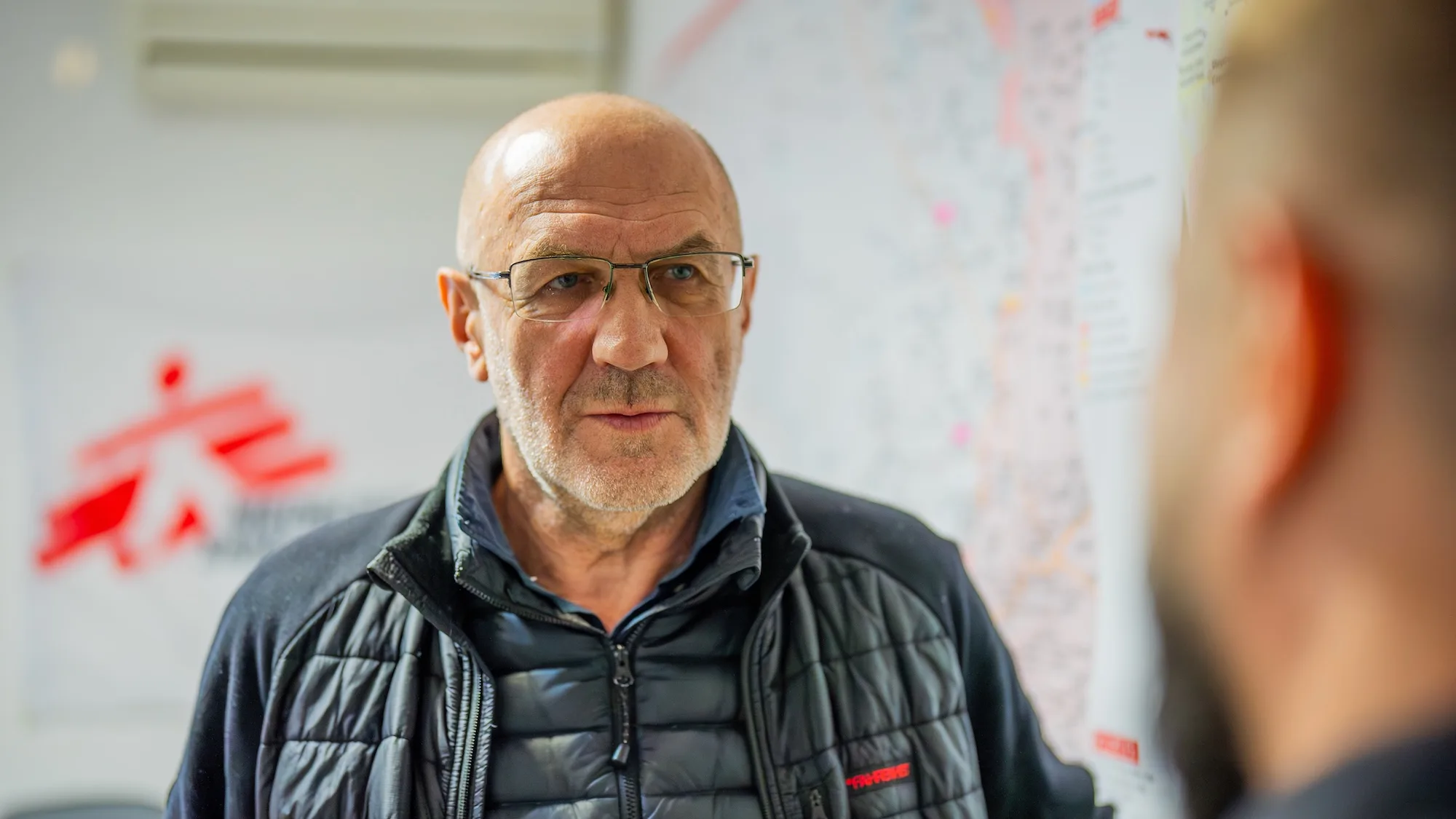Andriy has extensive experience in the humanitarian sector. He worked as an anaesthetist in war zones, organised medical aid in different parts of the world, and returned to Medecins Sans Frontieres with the outbreak of full-scale war in Ukraine.
In an interview with the Humanitarian Media Hub, Andriy spoke about his journey in the humanitarian sector, the challenges he has faced and the motivation that helps him to keep working.
Medecins Sans Frontieres in Portraits
“I had to face some terrible things”
– How did you come to work in the humanitarian sector?
My path to humanitarian work was quite unusual. Until 1988, I worked as an anaesthetist in Vilnius, Lithuania, but I was always interested in medicine in extreme conditions. So when the opportunity arose to go to Angola, a country suffering from civil war, I accepted.
It was a time of change in the world – the fall of the Berlin Wall, the collapse of the Soviet Union. I worked in a besieged town where there was constant bombing. We provided help to everyone who needed it, regardless of their political or ethnic affiliation.
Once I wrote a report on the critical humanitarian situation in the region, which fell into the hands of Médecins Sans Frontières. They contacted me, and in 1991 I helped them organise vaccinations for children in Angola. After the collapse of the Soviet Union, I returned to Lithuania for a short time, but a year later I rejoined Médecins Sans Frontières, and this was the official start of my work with the organisation.
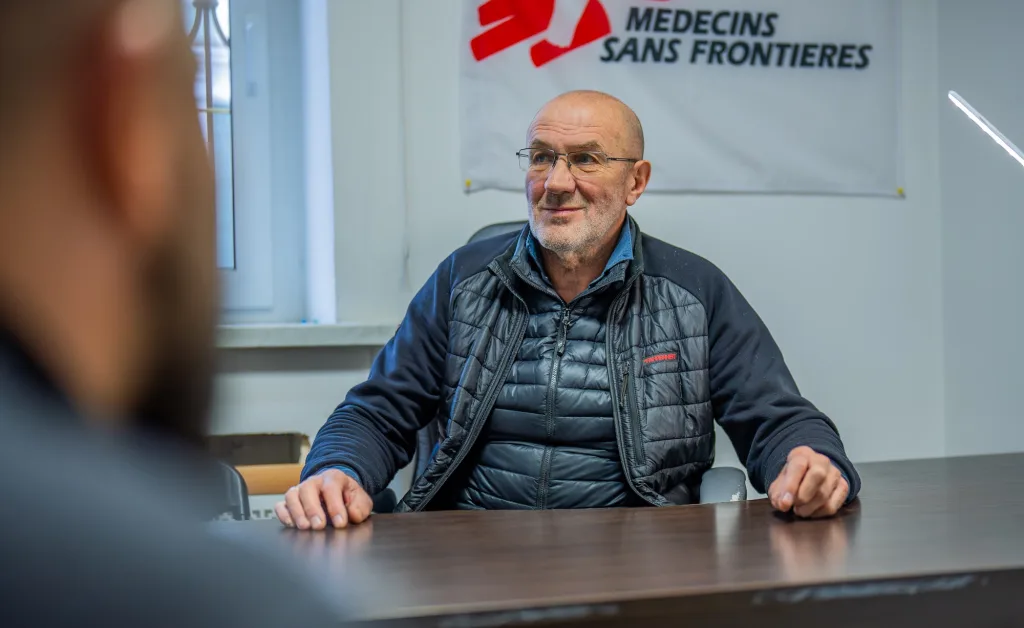
– What were the key challenges on your way?
The first years I worked as an anaesthetist as part of surgical teams, mainly in war zones – Angola, Bosnia, Rwanda, Chechnya. I had to face terrible things: bombing, mountains of corpses, cholera epidemics, mass murders. In Chechnya, we were rebuilding a hospital that had been destroyed as a result of the fighting, and we made sure that there were no armed people in the hospital or around it, and that no military vehicles were parked. After I left, I learned that the hospital had been destroyed by Russian aircraft.
In 1996, I was noticed in Brussels and offered to work in healthcare organisation at the international level. It was a new challenge. At the time, I was working as a project manager in Azerbaijan. And I realised that I was not quite ready for the new offer. So I went to study in the United States from 1998 to 2000 and got a master’s degree in international health and a subspeciality in tuberculosis epidemiology.
In 2004, I was invited to the headquarters in Geneva. I worked there for 10 years as a programme manager, organising medical aid in 5-6 countries.
In 2013, he moved to the WHO in Kyiv, where he worked on tuberculosis issues. During the Revolution of Dignity, he actively helped the wounded and tried to organise more effective medical care.
After 6 years at WHO, he moved to UNICEF, where he worked for 3 years as the head of the children’s health department. When the full-scale war started, he took his family abroad and returned to MSF (Medecines Sans Frontieres) to help in Ukraine. He is now focused on providing medical care to war victims. Six months later, my family returned to Kyiv.
Read also: Inna Ivanenko: “Patients of Ukrainian hospitals should not have to pay out of their own pockets”
– How did the war change your vision of work?
Unfortunately, Russia’s full-scale invasion of Ukraine did not come as a shock to me. We, the humanitarian workers, have been feeling it. The war has forced us to focus on how to adapt our work to the new conditions. The main task of Médecins Sans Frontières now is to get as close as possible to people who need help, but at the same time not to expose the medical team to extreme danger.
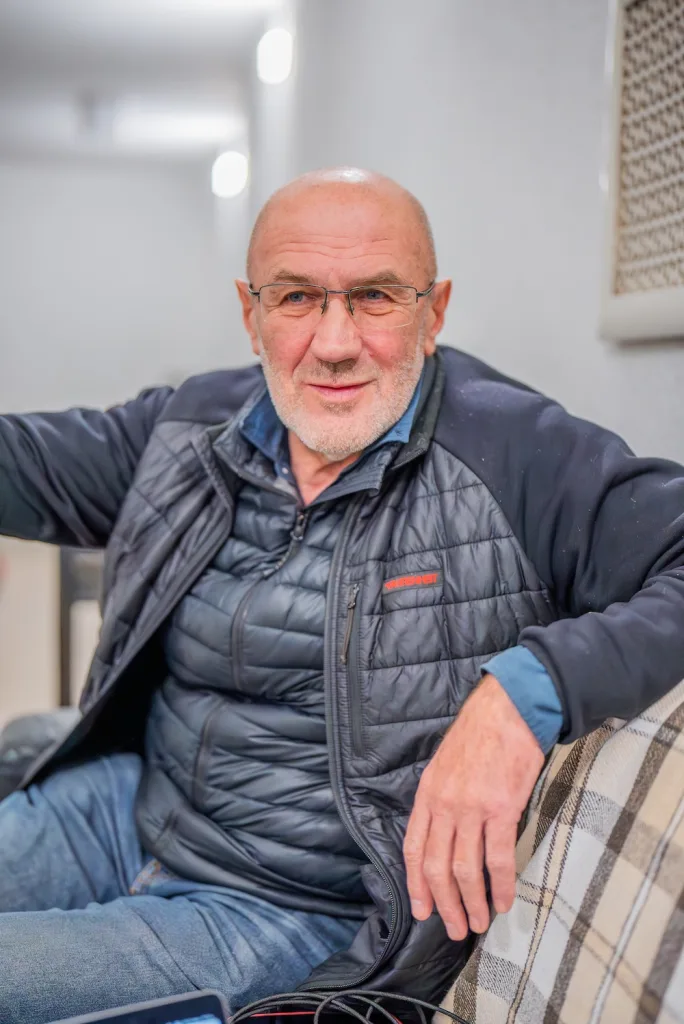
– What motivates you to continue working in this field?
My motivation goes back to the beginning of my career. Working as an anaesthetist, I often found myself at the end of the chain when something terrible happened, a complication occurred, or the disease was in a very advanced form. And I realised that the reason was often insufficient access to prevention and basic medical care. Hence the desire to improve access to healthcare for vulnerable populations, especially in conflict and humanitarian crisis zones.
– How has the war in Ukraine affected your work?
The war in Ukraine has once again shown the importance of horizontal solidarity. People in Ukraine understand and organise themselves; they do not need to be interfered with, but rather helped. I saw the incredible strength of spirit and self-organisation of people in Ukraine. Our task is to support them, provide the necessary resources and medical care.

Read also: Victoria Titova: “A city is not just buildings. It’s about life”
“Médecins Sans Frontières is funded by ordinary people”
– What are the key issues in the humanitarian sphere today?
Speaking in general about the humanitarian aid sector, one of the key problems is dependence on donors, who often promote the idea of process efficiency and sustainability of state institutions. This implies coverage of most, but often not all, people with services. The healthcare system becomes elitist, unable to reach all segments of the population, especially in times of war and humanitarian crises.
– How does your organisation engage and support volunteers and partners?
“Médecins Sans Frontières (MSF) avoids dependence on donors to dictate its policies. The organisation is funded mainly by individuals and organisations (98%), which allows it to maintain its independence and act in accordance with its principles.
Although the possibility of completely abandoning public funding was previously discussed, it was decided to retain a small percentage of funds from, for example, the European Union and some governments in order to be able to influence healthcare policy. However, practice has shown that this approach has not been very effective.
– Do you undergo audits?
– We have an internal audit. In addition, the association and the operating organisation are in constant interaction. The organisation regularly reports to the association on the funds spent. If the association has any questions or needs an audit, they can even hire independent auditors to check the organisation’s activities. Every year, a financial report is approved, a vote is held, and so on.
A lot of people – relatives, friends, acquaintances – give money to our organisation, and you are personally responsible for them.
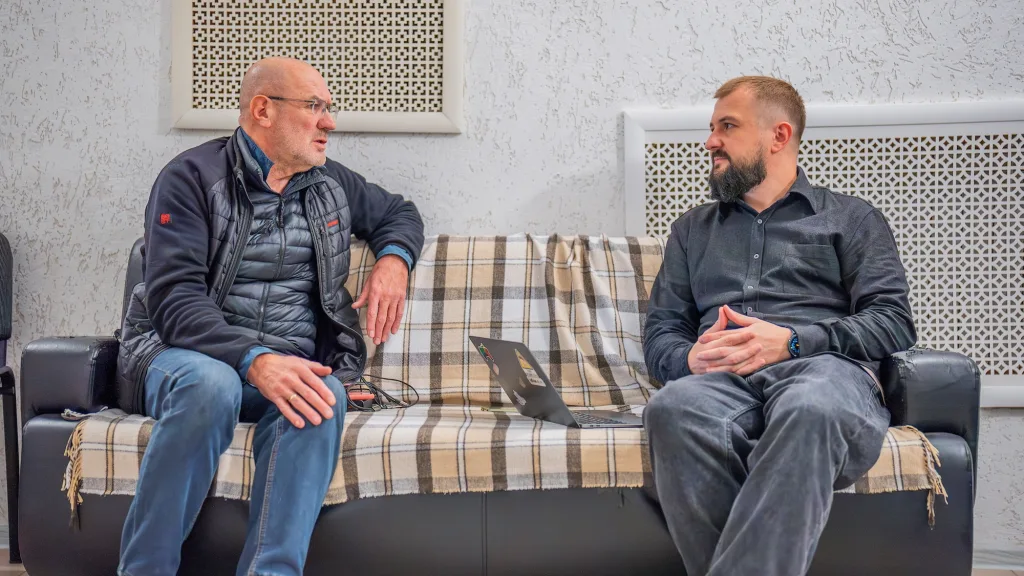
Read also: Head of Help in Ukraine Oleksandr Novikov: our leitmotif is that we are all volunteers at heart
– What programmes or projects are your priorities?
– Médecins Sans Frontières was created to respond to emergencies such as wars, epidemics and natural disasters. We work where people need help the most, where the healthcare system is not able to cover all the tasks in a war.
Now, of course, one of our priorities is to help those affected by the war in Ukraine. But we also continue to fight HIV/AIDS, tuberculosis, and malnutrition in other countries. We strive for a balance between emergency response and long-term development projects. For example, we not only provide emergency care to the wounded, but also help rebuild hospitals, train medical staff, and provide vaccinations.
– How to become an employee or volunteer?
– We always welcome new people who want to join our work. Positions are always open on the website of Médecins Sans Frontières, or you can apply online on recruitment portals in Ukraine. We need not only doctors, but also specialists in various fields – logisticians, engineers, financiers, psychologists. We are open to everyone who shares our values and is ready to work in difficult conditions.
– What is your current business vector?
– Our current focus is on helping people affected by the war in Ukraine. We work along the entire frontline, providing emergency assistance, mobile teams, surgical care, early rehabilitation, psychological support and PTSD treatment. We also help to evacuate the wounded and sick from the combat zones, provide people with medicines and basic necessities.
Read also: Niya Nikel: Women “Rule” This World and Make It Better
– What plans and goals does your organisation have for the future in Ukraine?
– We plan to expand our activities in Ukraine. In particular, we plan to open a new project in the Kharkiv region, create early rehabilitation teams, and expand our early rehabilitation experience to more hospitals. War is an epidemic of trauma. We see a large number of wounded, and on the other hand, an insufficient number of qualified physical therapy specialists. It is very important for us to find a new model in this process and optimise resources so that we can reach as many wounded as possible with early rehabilitation.
We want to help Ukraine recover from the war and provide access to quality medical care for all those who need it.
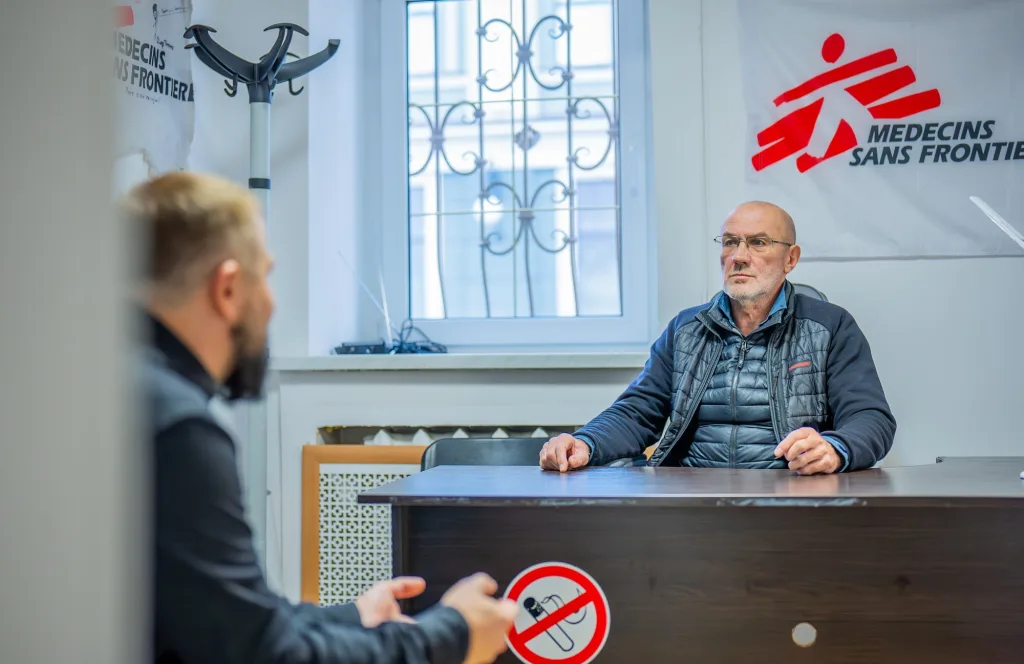
“Spread the word about our activities”
– How do you think everyone can contribute to your business?
– Everyone can contribute to our work. You can work for the organisation, take part in fundraising, or simply be aware of the problems we are fighting and spread the word about our activities. The more people who know about Médecins Sans Frontières and the challenges we are working on, the more people we can save.
– What books do you recommend to read? What inspires you?
– I recommend The Little Prince by Antoine de Saint-Exupéry – this book reminds us of the importance of humanity and kindness. I would also recommend The Wild West of Eastern Europe by Pavel Kazarin, a book about Ukraine, its history and present.
I am inspired by my friends, children, and the belief that we can make the world a better place.
– What would you do if there was no war?
– If there was no war, I would open a palliative care project to help people live their last days with dignity. This is a very important cause that, unfortunately, is often overlooked.
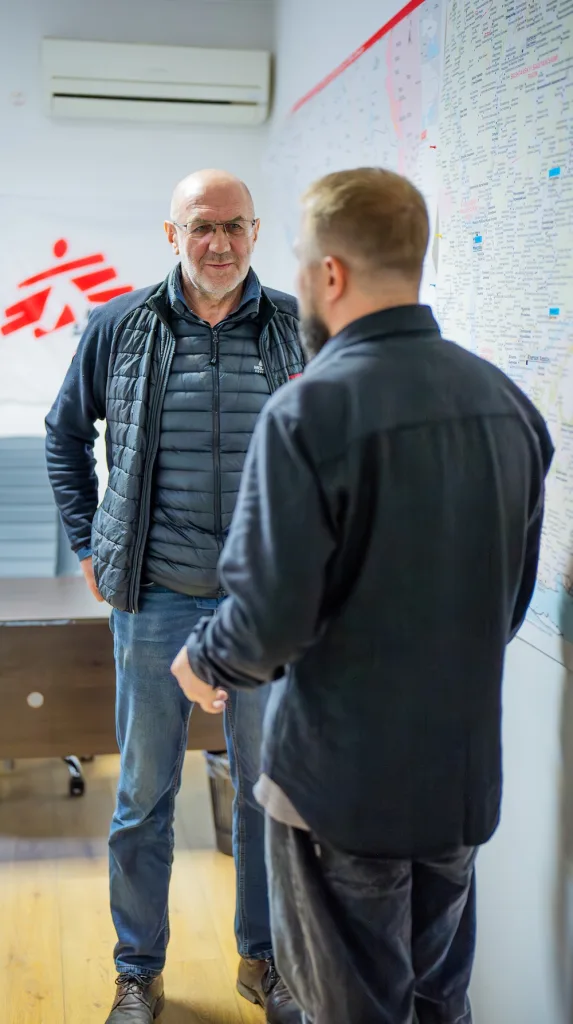
Read also: Maria Pavlichuk: At JuniorS, we are fighting for the space for childhood



